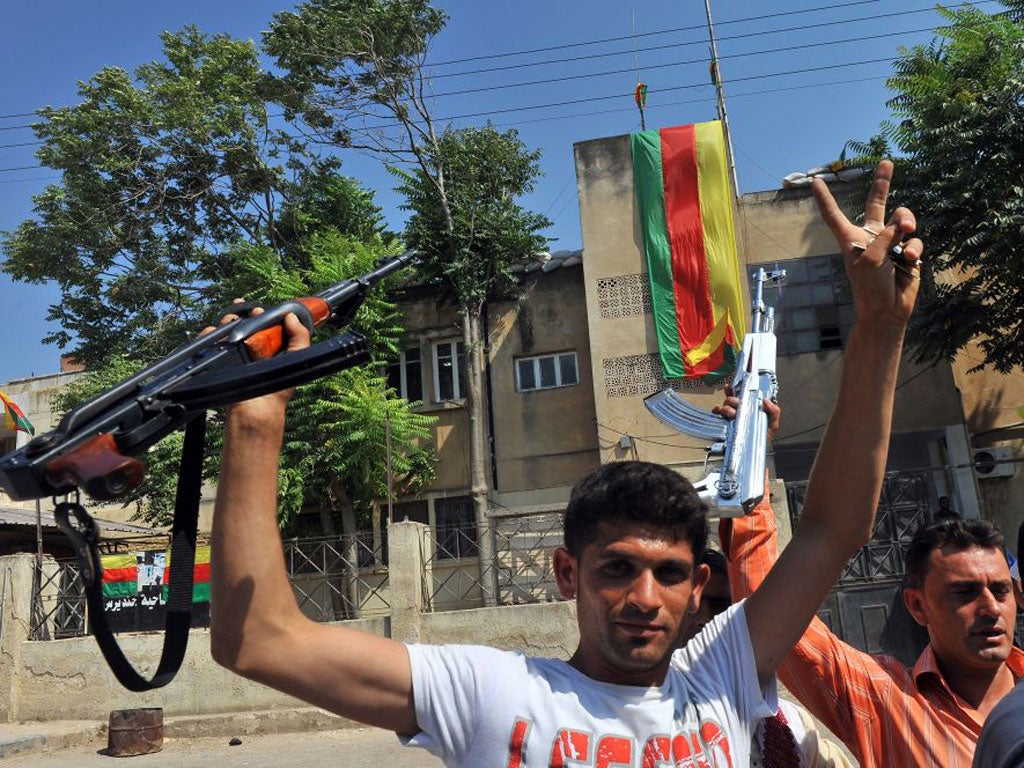Syria's Kurds flock to Iraq to prepare for Assad's onslaught
Secret training camps are revealed as Turkish forces open fire again

Your support helps us to tell the story
From reproductive rights to climate change to Big Tech, The Independent is on the ground when the story is developing. Whether it's investigating the financials of Elon Musk's pro-Trump PAC or producing our latest documentary, 'The A Word', which shines a light on the American women fighting for reproductive rights, we know how important it is to parse out the facts from the messaging.
At such a critical moment in US history, we need reporters on the ground. Your donation allows us to keep sending journalists to speak to both sides of the story.
The Independent is trusted by Americans across the entire political spectrum. And unlike many other quality news outlets, we choose not to lock Americans out of our reporting and analysis with paywalls. We believe quality journalism should be available to everyone, paid for by those who can afford it.
Your support makes all the difference.In secret training camps in the mountains and plains of northern Iraq, Kurdish Syrian army defectors are being drilled to protect the oil-rich areas in the north-east of their home country, which have so far managed to avoid being dragged into the civil war. Hundreds of Syrian Kurds are training with Iraq's Kurdistan Regional Government (KRG) Peshmerga forces, and there are plans to send the men back to protect the Kurdish regions of Syria should clashes break out in those areas with the government or the rebel Free Syrian Army (FSA).
"It's defence training in order for these people to defend their own communities … not for offensive purposes to go and attack," Falah Mustafa Bakir, the KRG's minister for foreign relations, told The Independent.
Syria's 1.7 million Kurds have largely taken a back seat in the 18-month struggle to oust President Bashar al-Assad, despite being one of the traditional bastions of opposition to his rule. After clashes in July, Syrian army forces pulled back from many of the region's towns and cities, leaving the Kurds free to begin building their own institutions such as police forces and local councils.
Mr Bakir said the Syrian Kurds should learn from the experience of the Iraqis, who gained de facto autonomy in 1991 after a no-fly zone was established in the north of the country and Saddam Hussein's forces pulled out of the area.
"There is a lot they can use for homework before the collapse of the regime," he said.
However, there are fears that it is only a matter of time before the chaos that has enveloped much of the country reaches Syria's Kurdish areas, particularly given that the Al-Hassaka province in which they are concentrated produces most of the country's oil.
The inevitable spillover has already begun. Oil pipelines have been attacked and last Sunday a bomb in a cement truck detonated outside a government building in Al-Hassaka's regional capital of Qamishli, killing four people.
Local Kurdish politicians speculate that the attack – the biggest blast in the city so far – was the work of an outside group.
In the canvas tents of Iraq's Domiz refugee camp, which now house around 25,000 Syrian Kurds, Abu Ali, a burly 28-year-old who works in camp security, says dozens of his friends are now in military training with the KRG.
"They are paid a small allowance by the KRG, but I don't know a lot about what they are doing there," he says, explaining that while they are in training the recruits are not allowed to make calls or leave the camps.
However, plans to return the trained soldiers to Syria appear to have been delayed by political infighting between Kurdish factions over the border. In July, the KRG president, Massoud Barzani, called the fractious Syrian Kurdish parties to Erbil to sign a power-sharing agreement.
Despite the agreement, opposition groups complain that Syria's Kurdish regions are being held within the tight grip of the Democratic Union Party (PYD), a group with close links to the Kurdish Workers' Party, which is fighting a separatist insurgency against the Turkish government and has been designated a terrorist group by the US and the EU.
Mustafa Juma, the secretary general of the Syrian Kurdish Azadi Party, claims the PYD has been blocking the return of the Iraqi-trained men because "they want to control the region alone".
The PYD denies having any armed elements. However, the new police forces which are springing up manned by armed volunteers are under their control.
In the desolate scrubland on the Syrian border, checkpoints on the Syrian side, once manned by the Assad regime, are now in the control of a new Kurdish armed group, the Popular Protection Units, known by its Kurdish acronym YPG. It is a secretive organisation, whose members refuse to speak to the press. And although they claim to be independent, they appear to be aligned with the PYD. Local politicians say they number somewhere around 1,000 men.
"The experience for us, the Kurdish history ... was that always the Kurdish people were soldiers for the others, so we decided to be soldiers for ourselves, for the Kurdish people only," said Saleh Muslim Mohammed, the PYD leader. "If somebody attacks us we will defend ourselves."
Join our commenting forum
Join thought-provoking conversations, follow other Independent readers and see their replies
Comments